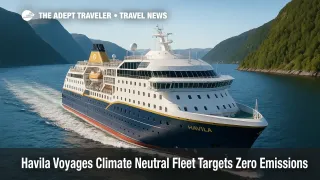Havila Voyages climate neutral fleet targets zero emissions

Havila Voyages and HAV Group have set a course to make the Norwegian Coastal Route fleet climate neutral, with a stated ambition of zero emissions. The plan covers Havila's four current hybrid ships and future newbuilds, aligning with requirements for the next contract period. The partners presented the roadmap at Arendalsuka on August 14 in Arendal, near Kristiansand Airport, Kjevik (KRS), about a 50-minute flight from Oslo Airport (OSL). Executives said a full round trip between Bergen and Kirkenes could be trialed as soon as this fall using biogas and battery power.
Key Points
- Why it matters: Norway's iconic coastal service could become a blueprint for low-carbon cruising.
- Travel impact: A climate neutral voyage would reduce local emissions and noise in fjords and ports.
- What's next: A full Bergen-Kirkenes-Bergen test run using biogas and batteries is targeted for fall 2025.
- Partnerships span retrofits for four ships and designs for future newbuilds.
- Strict environmental rules in the next tender period are shaping technology choices.
Snapshot
The partners intend to operate the Norwegian Coastal Route with a climate neutral profile, leveraging renewable biogas and large battery packs aboard Havila Capella, Havila Castor, Havila Polaris, and Havila Pollux. The fall pilot targets the 12-day Bergen-Kirkenes-Bergen loop, a journey of more than 5,000 nautical miles round trip, completed with biogas in the fuel tanks and optimized battery usage for low-emission port approaches. HAV Group's role spans systems integration and next-generation designs for newbuilds that could deliver zero-emission operations in the years ahead. The companies argue that clear, enforceable environmental standards in the next coastal-route contract will accelerate investment and de-risk fuel supply.
Background
Havila Voyages' four-ship fleet already pairs LNG-capable engines with some of the largest battery packs at sea, enabling several hours of silent, emissions-free sailing in sensitive fjords. Norway has steadily tightened maritime environmental rules, and the next tender for the coastal contract is expected to codify stricter emissions performance, pushing operators toward renewable fuels and deeper electrification. By committing to a climate neutral baseline now, Havila and HAV Group aim to meet, and eventually exceed, those standards. The Arendalsuka announcement signaled confidence that biogas volumes can be secured and that shore-power, charging, and storage upgrades will align with port infrastructure on the route.
Latest Developments
Arendalsuka reveal outlines climate neutral path
At Arendalsuka on August 14, Havila's CEO described a binding collaboration with HAV Group to deliver a coastal fleet that is at least climate neutral, while targeting zero emissions over time. The plan encompasses operational changes on the existing four ships as well as engineering and procurement for future vessels, ensuring compliance with the next contract's environmental terms. Presenters emphasized that the technology is ready, from battery-hybrid propulsion to fuel-flexible engines and advanced energy-management software. What remains, they argued, is steady regulatory clarity and predictable demand signals so suppliers can scale biogas production, bunkering, and portside charging to match the fleet's daily cadence and seasonal peaks.
Biogas plus batteries set up a fall pilot voyage
Havila says it is lining up a full-circuit Bergen-Kirkenes-Bergen pilot as soon as this fall that would run on biogas, complemented by deep-cycle use of the ships' large battery packs. The company is in talks with suppliers to fill tanks entirely with biogas for the trial. Executives framed the 12-day test as proof of concept for climate neutral operations over more than 5,000 nautical miles, with batteries prioritizing port entries, exits, and quiet transits in sensitive areas. Successful execution would validate supply logistics, engine performance, and onboard power management at scale, while giving ports and regulators confidence to push toward zero-emission requirements in the next award.
Analysis
If delivered, a climate neutral Norwegian Coastal Route would be a landmark for short-sea passenger shipping, where fixed schedules, repetitive legs, and frequent port calls suit battery-hybrid strategies and renewable fuels. The near-term focus on biogas is pragmatic. It leverages existing dual-fuel engine platforms and bunkering methods, while cutting lifecycle emissions compared with fossil LNG. Batteries, already sized for multi-hour operation, reduce fuel burn during low-speed maneuvers and in emissions-sensitive fjords. The bigger hurdles are commercial rather than technical. Biogas supply must be contracted at stable prices, with verifiable sustainability attributes. Portside electrical capacity and charging standards must keep pace with multi-call daily operations in smaller communities. Finally, the next contract's environmental clauses need to be detailed enough to justify capital expenditure across retrofits and newbuilds. HAV Group's integration experience and Havila's operating data strengthen the case, but the pilot voyage will be the measure of readiness, proving that fuel logistics, voyage planning, and passenger experience can align under a climate neutral operating model.
Final Thoughts on Havila Voyages climate neutral fleet
Norway's coastal service has long been a living laboratory for maritime innovation, and Havila's fall pilot could mark its next inflection point. If biogas sourcing, battery cycling, and port charging come together, the partners will demonstrate climate neutral operations on a complex, multi-port itinerary, setting expectations for the next contract and for European coastal services more broadly. For travelers, quieter approaches and cleaner air would be immediate wins, while the longer-term goal, zero emissions, remains the North Star guiding investment and design. The momentum now sits with the Havila Voyages climate neutral fleet.
